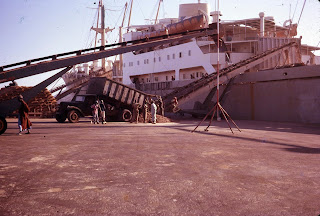Introduction:
Fishing causes me stress! Not the actual process of it, but I find it hard to reconcile my love of fishing, with my aversion to bloodsports! I have not, and would not, go out and shoot any animal for sport (except with a camera), but I have no problem throwing a baited hook into the water and catching a fish. I know that this distresses the fish - all scientific studies seem to indicate this to be true, and I read somewhere that fish can lose 40% of their bodyweight during a long fight (apparently they had previously caught and weighed the particular fish), and some die even after release due to the physical damage caused during the fight.
I suppose I would hunt animals for survival, and do not have a problem with anyone who hunts for food, but it is those who shoot for trophies, for sport, or just to kill, that concern me. But I digress from fishing.
Maybe it is because from my first fishing experiences we did eat what we caught, or gave it away to be eaten, including taking some round to a pelican who appeared to be a pet near where we lived!
 |
| Pelican in Luanda |
I think also the fact that you cannot see the poor fish struggling on the line until you land it, or that you do not actually see it take the hook, or that you don't hear its cries of pain, helps me to "overlook" the fact that it is still pretty cruel. The fish has a choice whether it bites my hook, unlike an animal in the sights of a high-powered rifle. All these help me to assuage my conscience and continue fishing, but I still feel a twinge of guilt, and this causes me some stress!
Fishing in Angola:
 |
| Fishing in Luanda |
I don't remember ever fishing before moving to Angola in 1960, but I do recall that the following three years were the best fishing years of my life! The photo of me was taken at the end of the "island" in Luanda, we used a large cockle-like shellfish for bait called Mabanga, and used to cut it into quarters - I used to take a whole one and bite pieces off to put on my hook, sometimes eating the bait as well (it used to be served as a shellfish dish in restaurants and bars, so not as crazy as it sounds!), which is what I think I was doing in the photo. The long sleeves were not because of cold, though Luanda did have a cool winter due to the cold Benguela current running along the coast, but rather because I used to suffer really badly from sunburn, so had to keel my arms covered.
I do not know the names of all the fish we caught, but the waters at this end of the island were a haven for small fish to around 2 pounds, including the occasional Puffer Fish or small Moray Eel. My father used to cast further out and there would catch Spotted Grunter to around 10 pounds. At the other end of the island the fishing was not so fast paced, but bigger fish used to congregate there, and occasional schools of Barracuda would be found, and I caught a large Red Sea Bream there once (around 10 pounds). On one occasion my father went snorkelling there with a friend and a spear-gun, and came face to face with a Brindle Bass twice as big as he was, but luckily he wasn't on the menu that day!
For a special excursion we went to the mouth of the River Quanza (in the days when it was still safe away from the cities), and on one occasion my father caught a Sand Shark, and a large Red Sea Bream, while I caught a few small fish. The Bream weighed in at over 30 pounds, and was shared among friends as well as providing us with some lovely meals.
 |
| Mum posing with the Sand Shark |
 |
| Me with the Sand Shark, the Bream was too heavy |
 |
| Dad with his catch |
There was another favoured spot to the North of Luanda, a bridge over the Bengo River, which at times of high water was a haven for small Tarpon (to around 5 pounds) - I say "small", because compared to some I have seen in books and on the internet these were modest, but they were still incredible sport. We used to use spinning lures for them, and when they got hooked they would launch out of the water and shake like crazy to try and throw the hook, which they did more often than not! I never did manage to keep one on my line, but my father was more successful, though on our first visit we lost most on the way up to the bridge as once clear on the water on being landed they started shaking again, and would get free. A basket on a long rope solved this problem though.
 |
| Posing with Dad's Tarpon |
Although we fished a lot in Mozambique during our time there, and I have fished in other countries as well, I still recall Angola as being the best fishing, possibly because the variety of fish caught was amazing.





















